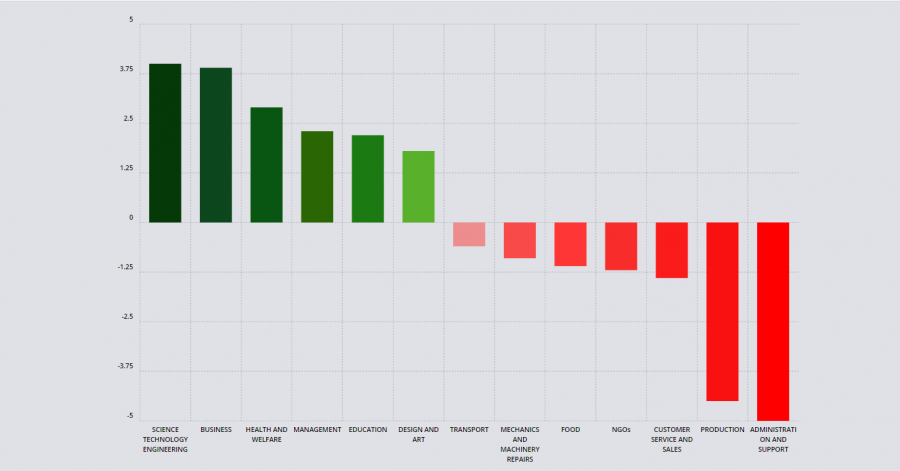The author of this text is Aleksandra Janakievska – a Product Growth Marketer at Brainster.io, a co-founder of Laika and a tech enthusiast. She has been working in Ed-tech and SaaS for the past 4 years.
The events of the past year have dramatically accelerated the pace of the societal digital transformation. 2020 was a reset year that pushed digitization, catalyzed tech, and propelled the world into the future. Awareness of the changing society was always present, but normalizing remote work, online meetings, and aggressive digitization wasn’t something we hoped to see so soon.
The job market is moving at full speed and some professions have it better than others. The data from the latest report of the World Economic Forum – The future of jobs report for 2020 – states that the job market will be significantly different in the next 10 years. It is estimated that as much as 50% of jobs will be replaced by automation. This does not necessarily mean that jobs will be replaced by computers, but that employees will work alongside advanced machines that are improving quickly.
Training employees will be crucial in the coming period because, in 10 years from now, it is projected that 90% of the jobs will demand digital skills. The young, the low-skilled, and the vulnerable categories of citizens are the ones who must develop or learn the necessary skills that will be imposed by the labour market. These are some important insights on future jobs in-demand, complied by Brainster, an ed-tech company.
Increasing and decreasing demand by industries
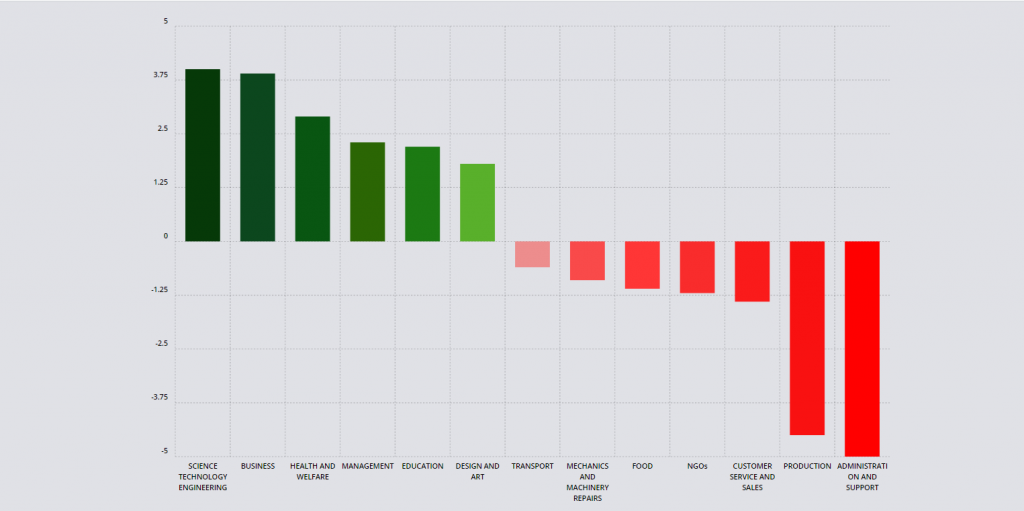
The analysis of the McKinsey Global Institute, as well as many other types of research, shows that the professions from different fields of STEM (science, technology, engineering, and mathematics) are the best-ranked professions in the world. Jobs such as office support and manufacturing are the professions that will decrease in the future. In fact, the automation that we will say more about below is a process that is intensified completely or partially in these fields.
Automation by industry (in thousands)
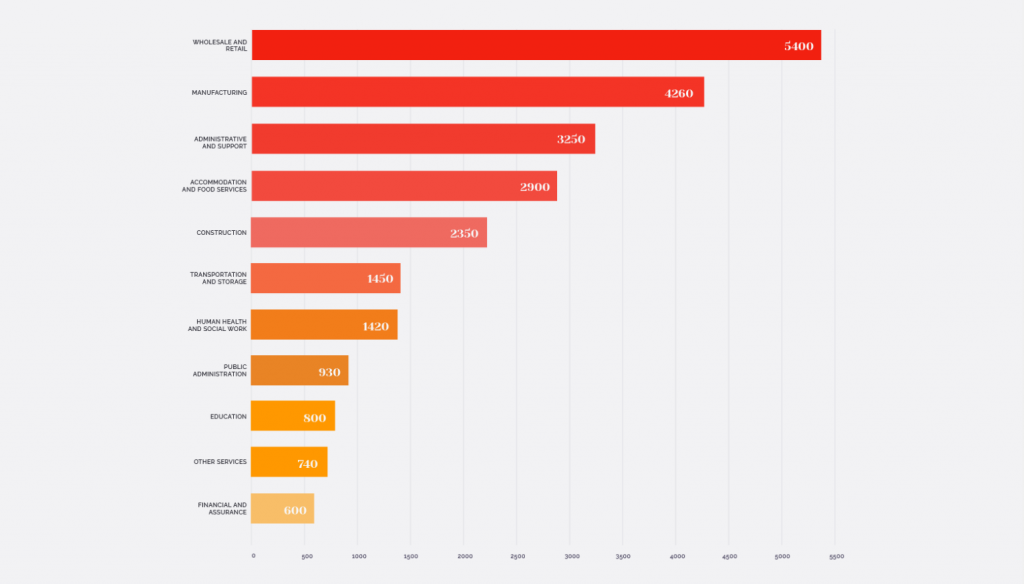
Automation in times of a global pandemic seems like a necessary and indispensable step, and getting the job done safely and efficiently are just some of the benefits. In Europe, the industries most at risk of losing their jobs as a result of the COVID-19 virus and automation are wholesale and retail, manufacturing, hospitality industry, and construction.
Jobs at risk of extinction (in thousands)
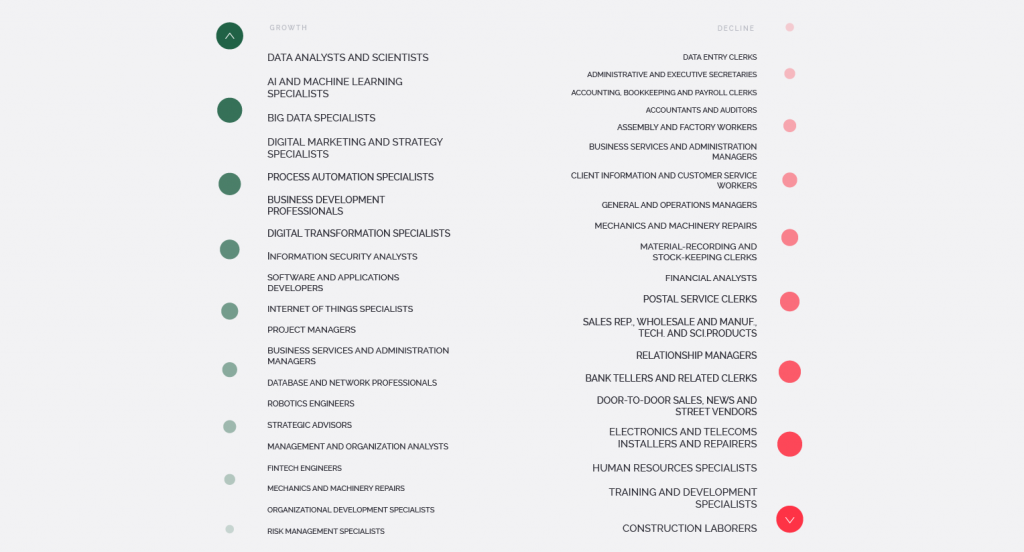
Job roles in increasing and decreasing demand across industries until 2025.
If you are considering pursuing higher education, enrolling in a course to learn a new skill, in-service training, or similar, what you are probably wondering: Is your education of choice relevant now, and will it be relevant at the moment you complete your education?
Let’s review the data-based projections for the professions of the future. According to a report by the World Economic Forum, the most in-demand professions will be Data Analysts and Data Scientists, Artificial Intelligence and Machine Learning specialists, Big Data specialists, Digital Marketing and strategy specialists, and Process Automation specialists.
The following professions will register a decrease in the labour force, i.e. jobs with reduced demand in the future: data entry clerks, administrative and executive secretaries, accountants, assembly, and factory workers.
The competencies and soft skills for the future

The blue colour indicates the percentage of companies that will increase the demand for this particular soft skill.
Yellow indicates what percentage of companies demand this particular soft skill will remain the same.
The red colour indicates the percentage of companies that will reduce the demand for this particular soft skill.
As already mentioned, automation will bring tectonic shifts in the world of work. This would mean a complete change or replacement of some jobs with others, but also the creation of new jobs. Millions of people around the world will potentially have to change their profession or retrain to be able to do the same job by upgrading to new skills. What can be noticed according to the latest data is the rise and demand of the intellectual, i.e. mental abilities of the employee at the expense of physical skills.
Critical thinking and analysis, problem-solving, and the use of technology and development will be considered key skills of the future. These skills are considered to be the most important in the past few years.
Top 15 soft skills on the rise by 2025

Recent soft-skills are the ability to self-manage, the ability to actively learn, flexibility, and stress tolerance or endurance of the employee.
These trends will also be a challenge for the companies themselves, which would mean that in addition to the process of work automation, there will also be a challenge for active participation and monitoring of job transformations, creating conditions for retraining, training of employees, and the like.
The future of jobs in North Macedonia
We already mentioned that STEM professionals hold among the highest ranked and highest-paid positions in the world. There is a large deficit of the aforementioned professionals in North Macedonia specifically. Taking into account this fact, the popularization of STEM is something that society counts on as a whole. Research shows that STEM education in North Macedonia has plenty of opportunities for improvement when compared to other European countries.
On the other hand, the North Macedonian labour market lacks professionals in specific fields that don’t require University education, as well. The analysis made by the NMK Employment Agency shows that besides IT Engineers, the labour market lacks high-school graduated professionals in the fields of biology, chemistry, and additional sciences with manual scopes of work.
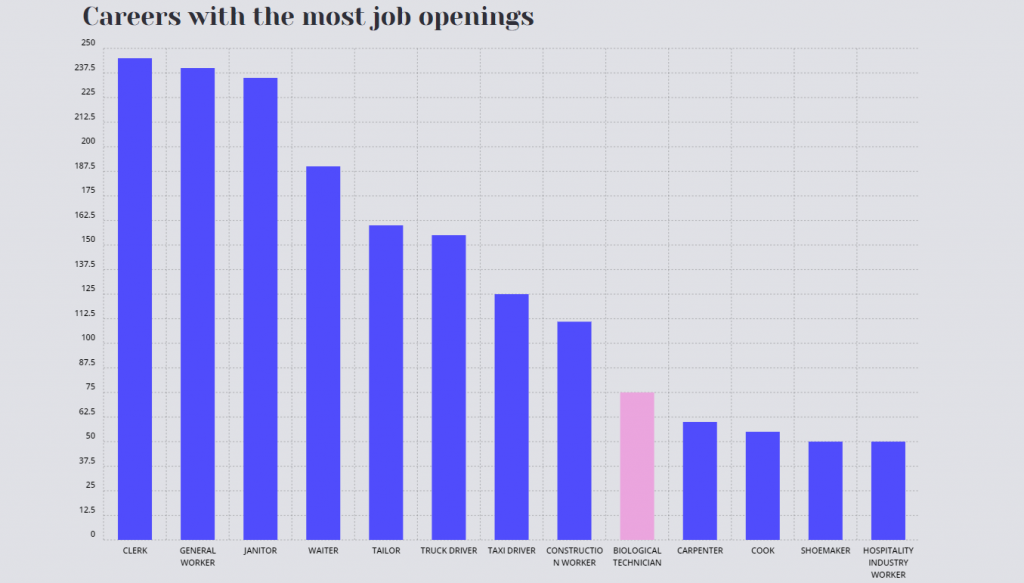
Forecast for the future deficit of IT staff
Most IT companies hire professionals with a University degree. The data from the State Statistical Office shows that there were 685 IT graduates in 2019, resulting in a deficit of 568 IT professionals, considering the average yearly growth of 1,253 new vacancies. The deficit for 2020-2023 is forecasted at 5,142 IT professionals.
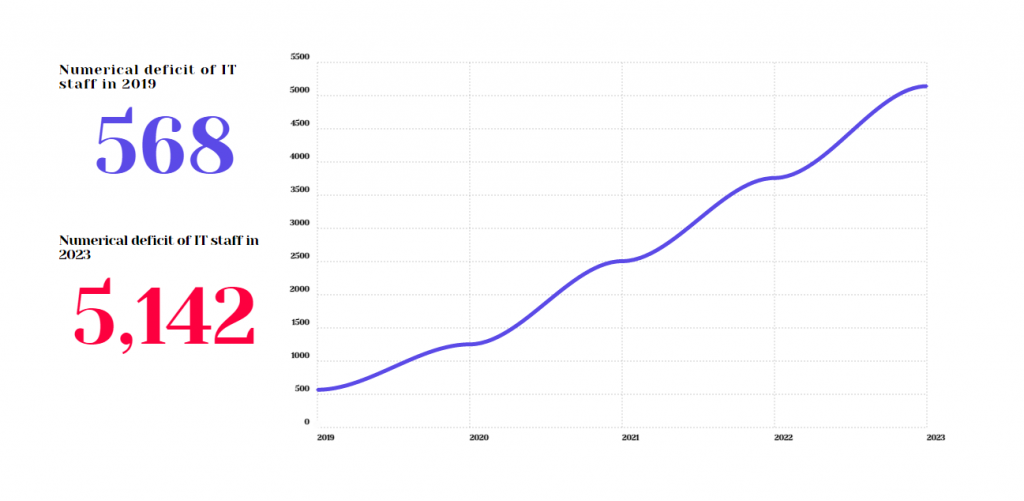
The highest-paid skills in North Macedonia
When analyzing the highest-paid skills on the North-Macedonian job market, the Computer Programming and other related IT jobs had the highest monthly average salary per employee – 66,556 denars before taxes, measured last November of 2020. That is almost 1,110EUR.
The second-highest-paid professions are The Financial and Insurance related professions with an average salary of 41,606 denars before taxes. Third on the list are professionals in the Legal and Accounting services with an average monthly salary of 34,434 denars, before taxes. The average monthly salary for all professions was 27,588 denars before taxes, which is 10 EUR short of 500 EUR per month.
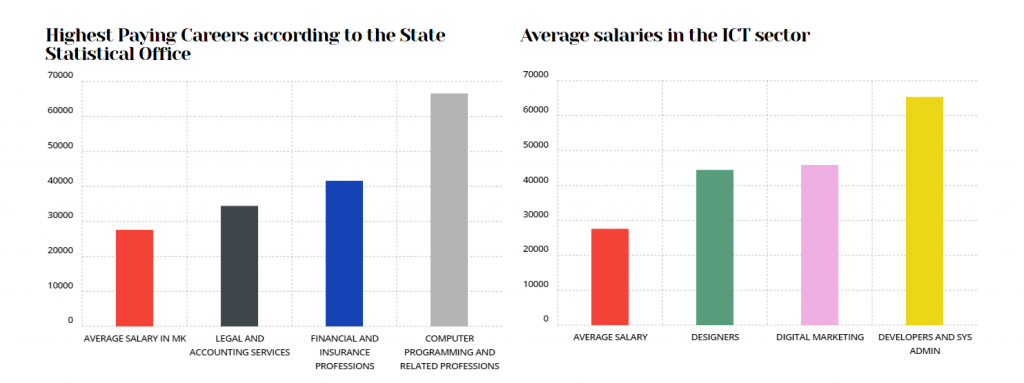
Average salaries in the ICT sector
According to the survey made in 2019, the developers and CS engineers are the highest-paid professionals, followed by designers and digital marketing professionals. The survey also showed a large gender imbalance – 80.96% of the surveyed identified as male and 19.04% identified as female, which is an indicator of the imbalance in the average monthly salaries as well.
Conclusion
The purpose of the presented data and the analysis that we made are to show the potential of the jobs that the future brings, the change of work in general, as well as the dynamics that these changes will bring. It is indisputable that education remains the key precondition for the choice of profession and career of the worker, but global trends indirectly allude to changes in the educational processes themselves. Education will have to be adapted and reaffirmed as a key partner and intermediary of companies in the process of generating qualified, able-bodied staff in the future.
The undeniable fact that the analysis also points out is that the professions in the field of IT are booming and this trend of increased demand for labour will continue in the future. Additionally, the highest paid jobs are those in the IT sector, where employees are valued and receive salaries that are much higher than average. Forecasts for increasing the deficit staff for this area in the next few years are important indicators for at least three things.
First, the salaries in this area will continue to rise due to reduced market competitiveness. Second, that it is necessary to invest intensively in STEM areas at all stages of education and third, regular assessments of labour market needs and retraining investments in these areas are needed to be able to respond to labour demand promptly.

